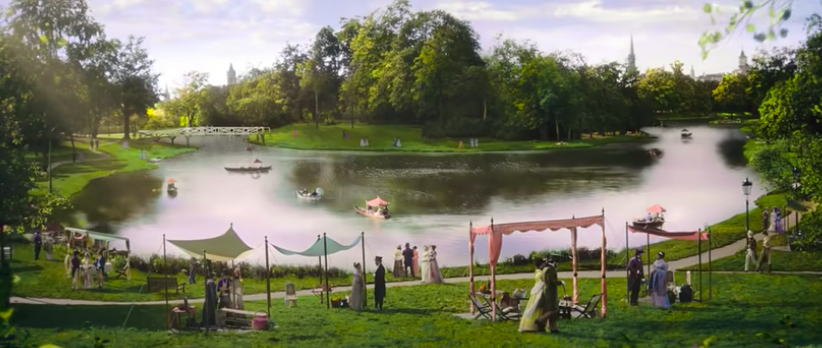Welcome to the 1800s — well, not the 1800s you might imagine. Bridgerton is the Gossip Girl of the 19th century, where the corsets are tight and the rules of society are tighter. And instead of New York City, we’re in the heart of London society, watching the drama unfold from the eyes of an anonymous pamphlet-writer.
This show plunges us right into this delicate craft of courtship and propriety, providing viewers with some of the more racy aspects of such a repressed society. I binged the show in 24 hours, and I had no regrets.
Bridgerton doesn’t necessarily do anything new with its story, which follows a girl raised with traditional values who looks for a husband, discovers matchmaking isn’t everything it was cracked up to be and, at the end of the day, still ends up married.
Bridgerton deviates in a slight rewrite of history, as not everyone of prominence is white. This is because in the show, King George III’s wife Queen Charlotte is a person of color, whose position as royalty therefore brings more respect and acceptance to Black individuals. Because of this — and from what I saw from headlines about Bridgerton — I expected a progressive retelling of the 1800s. But if the show had followed a definition of “progressive,” it wouldn’t have resulted in the same plot at all.
[Review: ‘Wonder Woman 1984′ was full of cliches and Hollywood cop-outs]
Bridgerton brings in subtle nods to modern society, sneaking instrumental versions of songs such as Ariana Grande’s “thank u, next” into the background of ball scenes and teasing the existence of an underground LGBTQ society. Nevertheless, our main conflict is still derived from society’s definition of a proper lady and the unhappiness that can result from conforming — or not.
I was intrigued by the rigid standards the show set forth early on, and despite the show’s predictability, I couldn’t look away from the opposite agendas of our two main characters, Daphne Bridgerton (Phoebe Dynevor) and Simon Basset (Regé-Jean Page). Their reluctance to like each other leads to the slow burn of their passion for one another and mirrors our culture’s obsession with what happens when two people who barely know each other get married. Why do shows like The Bachelor and 90 Day Fiancé do so well? Why does the idea of arranged or rushed marriages shock us so much? Here’s why: They defy contemporary definitions of marriage and lead us to question our definition of commitment entirely.
I wanted to dislike Daphne Bridgerton so bad. She had little to no personality, and her identity originated from her obedience. Deynor’s appearance in the show reminded me of a young Natalie Portman, and I couldn’t get over those god-awful bangs. But I watched episode after episode, enthralled by Daphne’s shelteredness when it came to the bedroom and her surprising wit when it came to climbing the ranks of society, eventually feeling satisfied with her character arc.
[Review: This season of ‘The Mandalorian’ was the most satisfying ‘Star Wars’ addition yet]
There’s not enough time to get into all the side plots, but overall, Bridgerton unleashed struggles of wealth, power, lust and free will onto most of its characters. Basset was a gorgeous display of masculinity and the voice of progressive reason, refusing to “own” a woman. While at some times his character felt performative and his shirtless scenes felt drawn out, his struggles were the most profound and the biggest driving force of the plot.
This show took the scheme of a Jane Austen plot and turned it TV-MA with its risqué themes and scenes, capturing the worst norms of the “olden days” while still exploring the allure of love and status. I wish the identity of Lady Whistledown, our narrator, wasn’t revealed at the end of this season, as this takes away from the element of mystery that seemed crucial to the show. With most loose ends tied up by the end of the season, it’ll be interesting to see where producer Shonda Rhimes will take the series next.



